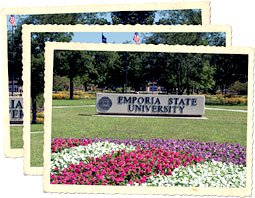Emporia State University: Rigorous Assessment Makes for Hall-of-Fame Teachers
Practice makes perfect, and so does quality assurance.
Your content has been saved!
Go to My Saved Content.
Emporia State University's teacher-education program is simultaneouslyone of the oldest and one of the most modernin the country.
Founded in 1863 as the Kansas State Normal School, Emporia was, morethan a century later in 1990, among the first universities to join forceswith local schools to create professional-development programs.
Emporia's Teachers College has also pioneered the use of a universalstudent-assessment system to replace the myriad standards and gradingschemes of various professors typically used to measure student success.Faculty use the results to pinpoint the program's strengths and weaknessesand ensure each graduate has the skill set required of teaching.
The college works with dozens of partner school districts, ensuring thatcandidates get their first taste of a real classroom in their sophomore year.Elementary school educators-to-be begin with observations, then work upto teaching individual and small-group lessons, and finally spend their fullsenior year as interns in two local schools. (Secondary school candidates dothe same, but students teach only for the spring semester.)
All the while, professors observe them in the field and provide feedback.Class discussions and readings revolve around candidates' experiencesin the schools. Seniors receive weekly evaluations from theirmentor teachers (who in turn receive training and support from Emporia).
Tamara Cassidy, a 2006 graduate, recalls that when she started work,"it felt like I'd already taught for a year. I felt prepared for a lot of thebasics, so I was able to focus on more nitty-gritty things, like how toadapt my lessons to meet the needs of all my students."
Assessments at Emporia emphasize skills that reflectthe college's essential concept of a teacher: critical thinker,creative planner, and effective practitioner. Candidates mustpass muster at multiple checkpoints, starting with entry intothe teaching program as sophomores (11 percent are rejectedthere); grades, test scores, faculty recommendations, mentorteachers' evaluations, and demonstrations of technological competenceall factor in. A capstone is the Teacher Work Sample, a seriesof assessments illustrating how well a student teacher delivers an entireunit of instruction.
Disposition matters, too; any faculty member from the TeachersCollege, the university at large, or K-12 partner schools may raise concernsabout a candidate's personal traits, leading to counseling or evenexpulsion from the program. All told, about 5 percent of students persemester fail to meet the benchmarks.
"Not everybody gets to be a teacher here who wants to be," saysTeachers College dean Tes Mehring.
The rigor appears to have a payoff. Emporia surveys show that principalsconsider them well prepared on a range of knowledge and skills.More than 90 percent of graduates are still teaching after three years;one in six Kansas teachers is an alum.
And that's how Emporia wants it. Beyond the Teachers College, thewhole university makes teacher preparation an avowed priority, and it'sno coincidence the campus is home to the National Teachers Hall ofFame.
Vital Stats
- Location: Emporia, Kansas
- Degrees conferred: Bachelor's or postbaccalaureate licensure
- Annual graduating class: 275-320
- Time in the field: 1 semester (secondary school) or 2 semesters (elementary school), plus multiple shorter visits
- Highlights:
- Full year in professional-development schools (elementary school only)
- Uniform assessment system
- Teacher Work Samples